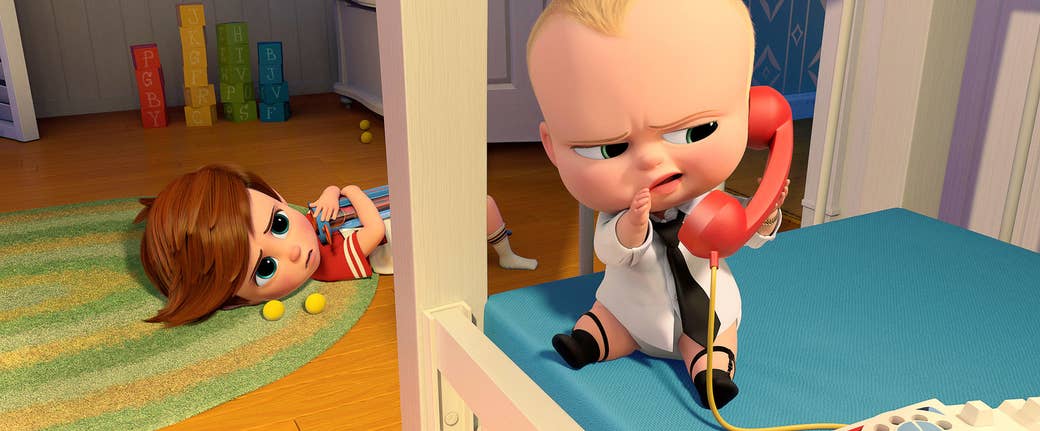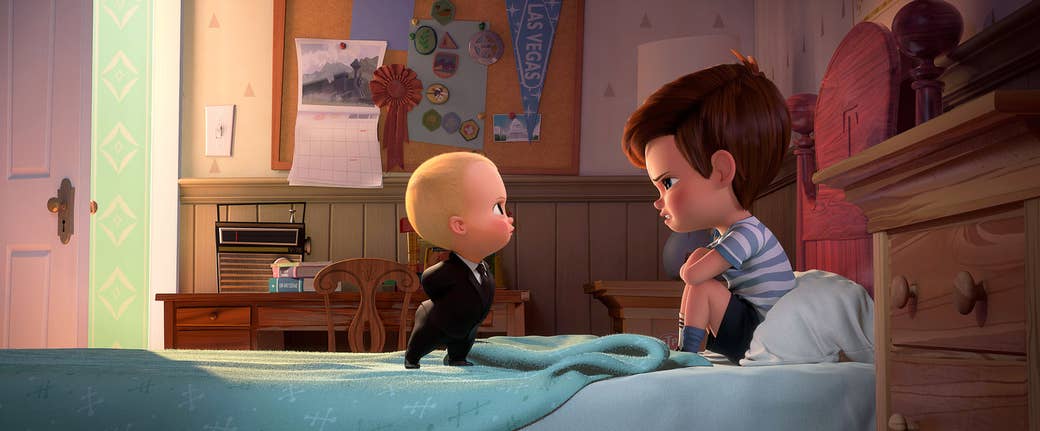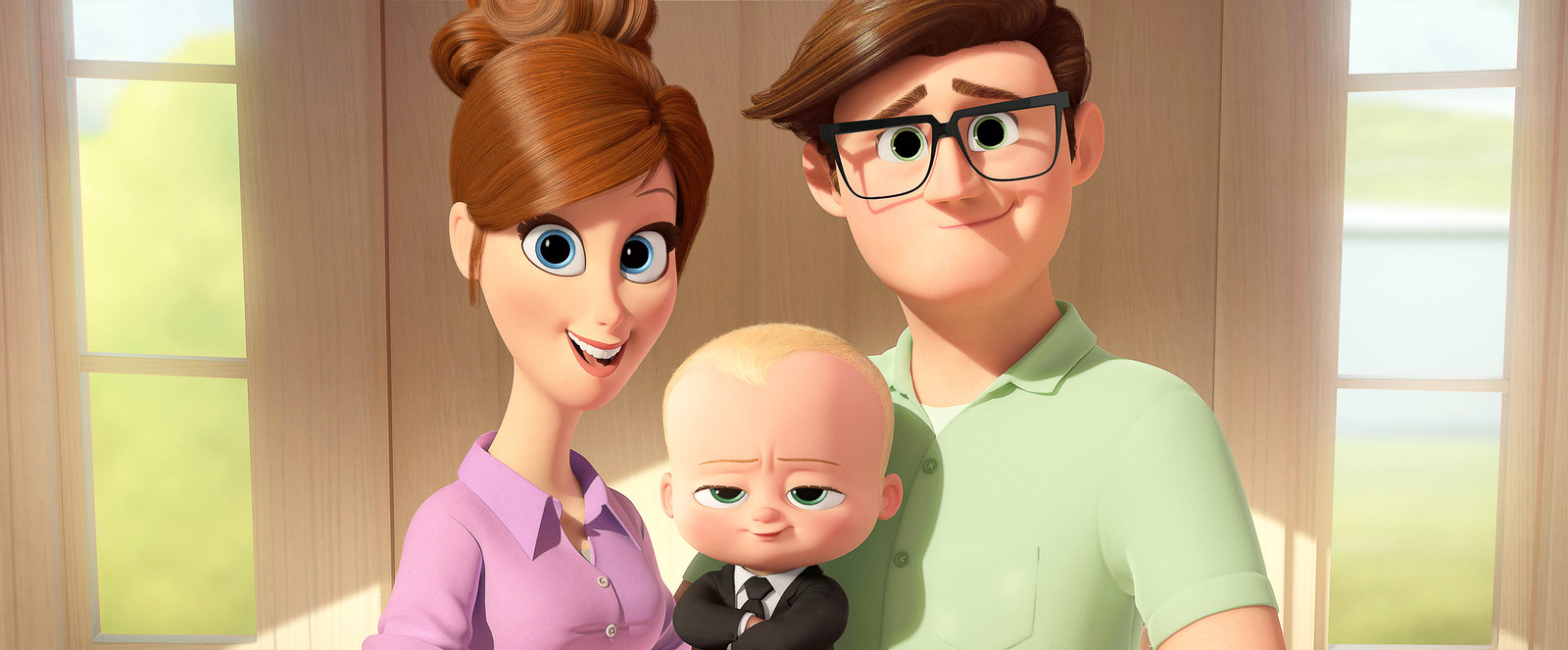
Earlier this week, when the Academy of Motion Picture Arts and Sciences revealed their 2018 Oscar nominations, there were a few clear surprises. James Franco didn’t get a best actor nomination for The Disaster Artist, and The Florida Project was snubbed for Best Picture. But the real surprise was in best animated feature, where The Boss Baby was nominated alongside movies like Coco and Ferdinand. Many internet commenters weren't pleased about the nomination — say “the Oscar-nominated film Boss Baby” out loud to yourself and it’s relatively easy to understand why — but the outrage misses the most important thing about the movie.
The Boss Baby is very good.
I watched Boss Baby for the first time on a flight, which is never the right way to watch any movie because you’re always predisposed to enjoying it too much, and also, public weeping. But after the flight, I watched it again. Then two more times. I was on a book tour at the time, and while I traveled from empty hotel room to empty hotel room, The Boss Baby was a constant companion. (You know what goes well with the little Cup Noodles you can buy from the hotel lobby for $2.99? The Boss Baby.) Then I watched it on my flight back because the airline was still showing it and no one on the flight knew that I had already seen it four times. I’m watching it again right now.
It’s an ideal kids movie because it remembers that it has both an adult audience, who is looking for something to break through their crushing ennui, and a younger audience who thinks a baby farting through talcum powder is very funny. It’s a tough sweet spot to hit and if done wrong can feel opportunistic and cynical, but The Boss Baby is endlessly hopeful. Look at it as a response to the kinds of movies that serve as a great example of how the shitty attitudes of pessimistic adults ruin everything.
The plot of The Boss Baby is deceptively simple. Seven-year-old Tim Templeton lives in bliss with his parents as an only child until a new baby brother — whose name is merely “Boss Baby” because he is The Boss — shows up and ruins everything. Boss Baby is needy and demanding, waking his new parents up in the middle of the night, demanding feedings and near constant attention, all of which takes precious parental care away from Tim. He’s also an employee of Baby Corp. and is on a mission.
Boss Baby has come to infiltrate Tim’s parents’ jobs at Puppy Co., one of Baby Corp.’s competitors in the marketplace for providing cuteness, thereby getting a market share of adult attention. If puppies are too cute, Baby Corp. argues, then people will stop wanting babies. Boss Baby’s assignment is to stop Puppy Co. from releasing a new, cuter-than-ever “Forever Puppy,” which is engineered to live forever. (In the end, spoiler, it’s revealed that Puppy Co.’s CEO is actually a former employee of Baby Corp., who was fired in order for a younger girl baby to take his spot. He’s now out for Baby Corp. blood, using puppies as a way to get back at the company. Honestly, it’s just like Office Space. I’m so glad it’s getting a sequel.)

On the surface, the plot is admittedly absurd, but like all good children’s movies, it’s actually a deep meditation on loneliness, and how easy it is to lose focus on what really matters in life. (Similarly, Toy Story was about how we’re all going to die; Up was about how everyone we love is going to die; The Emoji Movie made us all want to die.) It’s too facile to say it’s just a movie about a baby who wants a promotion; rather, it’s a commentary on how unsatisfying it is to be cold and calculating, and to focus on work and nothing else. It reminds the viewer to share, a lesson that seems more necessary for the adults watching than the kids. Boss Baby is about the failure of capitalism, about soulless careerists, and most surprisingly, about how angry white men get when they’re replaced by young, able women.
I’d argue that it’s a movie for the Donald Trumps of the world, for them to learn a lesson about either being in charge or being a baby — but not being both. That said, Boss Baby is actually effective and provably talented at his day job. But that’s not the point of this movie. Boss Baby learns a lesson about family, about forgoing the corner office, and about sticking your neck out for the people you care about. Yet inexplicably, Boss Baby hasn’t received even a fraction of the credit it’s due: It’s funny, and everyone in it is upsettingly adorable, and did I mention the entire plot hinges on a tiny baby man in a suit who keeps throwing wads of cash at strangers? What do you vultures even want? Not everything can be Lady Bird!
What do you vultures even want? Not everything can be Lady Bird!
The Boss Baby is deeply self-aware of how on the nose it is, at least with its casting. It features Alec Baldwin in the role of Boss Baby, his trademark growl interrupted only by a few moments of his newborn wail. The casting choice is both inspired and aggressively apt as Baldwin is, by most accounts, an oversized toddler himself who cries every time he doesn’t get his way and walks with that specific, childlike combination of vague hesitance and wild confidence. And, intentional or not, Boss Baby is a clear amalgamation of some of Baldwin’s most beloved characters. He’s ruthless like Blake in Glengarry Glen Ross, a flawed but buttoned-up executive like Jack Donaghy in 30 Rock, and kind of a jerk like, well, Alec Baldwin. He’s a great live-action actor when it comes to playing babylike men — his Saturday Night Live Trump impersonation seems like another clear fit — so why not have him just be a fucking baby? Boss Baby makes milk martinis and wears sock garters and asks for espresso-based coffee drinks. He makes a joke about how “cookies are for closers.” This is a good movie.
The ire against Boss Baby — which, again, is no more and no less than an animated movie about a baby who is mad at families and very into capitalism but learns an important lesson about both — is entirely outsized. Indeed, the strangely aggressive disdain for it seems to speak more to how suspicious adults are about anything presenting itself as simple fun. There’s no dark ulterior motive to the movie or any ugly details about an actor going method and becoming abusive to all the women on staff. It’s also not cloying or condescending in trying to teach you a lesson. It’s simply 90 minutes of watching a baby act like a grown up, which is funny — in part because there are so many man-babies ruining our lives day after day, but also because a baby holding a briefcase is funny.
Like a lot of great kids movies, there’s an allegory under the poop jokes, but it still works on the very basic level of being delightful and simple. Conversely, movies like Up or Zootopia are so steeped in meaning, you can’t watch them without considering your own mortality, or how everyone’s a racist, or at least about how rabbits are racist? While it’s easy to draw parallels between the movie and our current corporate dystopia, it actually works because it offers a brief reprieve from anything rooted in context or reality. The suspicion around it says little about the movie and volumes about what’s wrong with all of us. We’re so ready to be disappointed. Watch The Boss Baby. You’ve earned it.
While people are seemingly ruffled by the nomination, Boss Baby should win every Oscar, even Cinematography, Actress in a Supporting Role (Lisa Kudrow?), and Sound Mixing. Take Casey Affleck’s Oscar from last year and give it to whoever thought, “What if Jack Donaghy was a baby but he was still Alec Baldwin? Also, what if at the end of the movie, all the other babies shower Boss Baby in bottles and bottles of milk. That’s fine, right?”

In a scene at the very beginning of The Boss Baby, the titular Boss Baby goes through the baby-making machine: quite literally a machine that all newborns go through. All the little babies are weighed, powdered, given a soother and little white shoes. Boss Baby looks disoriented, landing on the conveyor belt backwards and screwing up the whole process from the beginning — he gets baby powder on his face instead of his butt, his diaper is put on backwards, (oh no, his face seems to say, my tiny unseen penis!) his shoes are shoved onto his hands. At the end of the process, babies are tickled with a feather and then sorted into families.
But when Boss Baby enters the final phase, he doesn’t react to the feather, a kind of glitch in the system and in what’s expected of a newborn. The light at the top of the contraption blinks red instead of green and says “Management.” He’s sorted down a different chute, fitted with his trademark little suit, and given a briefcase before taking his place in a faceless row of cubicles. It’s this brief moment at the beginning of the movie that sets off all this trouble — the arbitrary choosing of who gets to be at the top of the hierarchy, and how much damage they can do to the whole system. The magic is in both the inherent cuteness of the scene, and the dystopia of it, too. From the very beginning, no one gave Boss Baby a chance to be a baby, and instead gave him too much power and too much ego. Hate The Boss Baby all you want, but it’s undeniable that this animated movie gave us more relevant life lessons than most live-action movies last year. Just lean into it. It’s okay to feel good sometimes. ●
